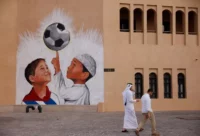
Why the World Cup Belongs in the Middle East
When FIFA announced in 2010 that Qatar would host this year’s World Cup, football fans and sports pundits were left scratching their heads. Qatar, it was said again and again, had no real business hosting the tournament: The weather is too hot; there aren’t enough stadiums; the country doesn’t even have a halfway decent football team. And of course, there was the question of who would be building the sites for the games and under what conditions. As the regretful former FIFA president who had announced Qatar’s winning bid 12 years ago said recently of the country, “Football and the World Cup are too big for it”.… Seguir leyendo »










